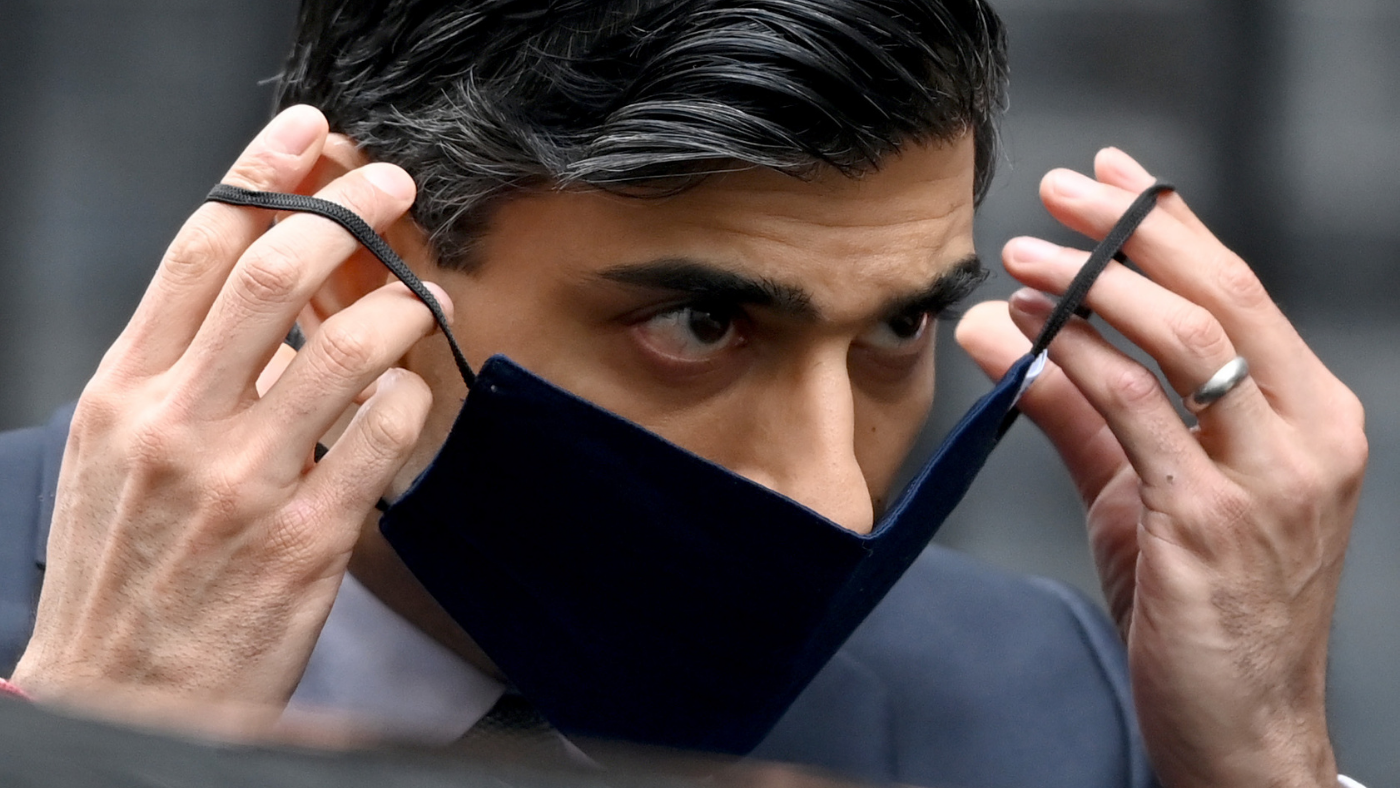Is it safe to ditch face masks after ‘Freedom Day’?
Ministers keen to drop all coronavirus restrictions despite warnings from health experts

A free daily email with the biggest news stories of the day – and the best features from TheWeek.com
You are now subscribed
Your newsletter sign-up was successful
Senior cabinet ministers are broadcasting their intentions to ditch face masks immediately after coronavirus restrictions are fully lifted - but health experts remain more cautious.
As the clock ticks down until so-called Freedom Day, Chancellor Rishi Sunak told business leaders at The Times CEO Summit yesterday that he would stop wearing protective face coverings “as soon as possible” once legally allowed to do so.
That vow was echoed by Environment Secretary George Eustice, who told Sky News that he would no longer mask up in indoor public spaces “once I'm told it's safe not to”, adding: “I want to get back to normal.”
The Week
Escape your echo chamber. Get the facts behind the news, plus analysis from multiple perspectives.

Sign up for The Week's Free Newsletters
From our morning news briefing to a weekly Good News Newsletter, get the best of The Week delivered directly to your inbox.
From our morning news briefing to a weekly Good News Newsletter, get the best of The Week delivered directly to your inbox.
However, according to The Telegraph, while the government is expected to go ahead with the scheduled ending of all Covid-19 measures in England on 19 July, advice to wear masks “is set to remain in place”.
Ruling out mandatory masks?
Sunak and Eustice’s comments are the “latest sign” that the lifting of restrictions will not be delayed for a second time, says The Times, after Boris Johnson pulled the plug on the original deadline of 21 June.
Jacob Rees-Mogg has also signalled that what the Daily Mail describes as “the remaining draconian curbs” are on the way out. The House of Commons leader told MPs yesterday that 19 July “is an end point and so it should be”.
A free daily email with the biggest news stories of the day – and the best features from TheWeek.com
The ministers spoke out after leaked government documents revealed the potential economic fallout of maintaining restrictions beyond Freedom Day. Modelling by the Events Research Programme found that even if mandatory mask-wearing were the only restriction to continue, the events industry would reach just 82% of its (pre-Covid) 2019 turnover.
Members of the anti-mask movement are also pointing to latest Covid infection and vaccination rates in the UK.
Hospital admissions for patients with the coronavirus have not surpassed 250 per day since restrictions began easing on 12 April, compared with a peak of more than 4,500 in January, according to government data.
And the Office of National Statistics reports that research suggests eight in ten adults would have tested positive for antibodies against Covid as of the week beginning 7 June, either because “they had the infection in the past or have been vaccinated”.
As the national rollout of vaccines continues to steam ahead, the prime minister is also considering easing restrictions on foreign travel, with plans to ditch quarantine requirements for Britons who have had both doses. Latest Oxford University tracking data shows that 64% of people in the UK have received a first jab, and almost 47% are fully vaccinated.
Better safe than sorry
Public Health England’s (PHE) Dr Susan Hopkins has told MPs that the focus will shift to personal responsibility once Covid restrictions are lifted. “I think we will all need to make decisions for ourselves, particularly on wearing masks, using better ventilation, hand hygiene,” she told members of the Commons Science and Technology Committee last week.
Some health experts and politicians are in favour of retaining rules on mask wearing, however.
London Mayor Sadiq Khan and travel watchdogs “have warned that scrapping the requirement to wear a face mask on the Tube and buses could backfire”, the city’s Evening Standard reports.
A spokesperson for the mayor argued this week that face coverings give “many Londoners the confidence that they can travel safely” on public transport, and would also be “a vital part” of encouraging visitors back to the capital after restrictions ease.
A recent nationwide survey by Transport Focus and London TravelWatch found that six in ten respondents wouldn’t use public transport unless fellow passengers were required to wear face coverings. And 43% said they would continue wearing a covering after the rules are scrapped.
Current guidance from the World Health Organization (WHO) also backs mask-wearing “as part of a comprehensive strategy of measures to suppress transmission and save lives”. The UN health agency’s advice has not been altered by the spread of variants of the Covid-19 virus, with a spokesperson telling the British Medical Journal in February that “the modes of transmission have not changed”.
Julia O'Driscoll is the engagement editor. She covers UK and world news, as well as writing lifestyle and travel features. She regularly appears on “The Week Unwrapped” podcast, and hosted The Week's short-form documentary podcast, “The Overview”. Julia was previously the content and social media editor at sustainability consultancy Eco-Age, where she interviewed prominent voices in sustainable fashion and climate movements. She has a master's in liberal arts from Bristol University, and spent a year studying at Charles University in Prague.
-
 A Nipah virus outbreak in India has brought back Covid-era surveillance
A Nipah virus outbreak in India has brought back Covid-era surveillanceUnder the radar The disease can spread through animals and humans
-
 Is the US about to lose its measles elimination status?
Is the US about to lose its measles elimination status?Today's Big Question Cases are skyrocketing
-
 Covid-19 mRNA vaccines could help fight cancer
Covid-19 mRNA vaccines could help fight cancerUnder the radar They boost the immune system
-
 Is this the end of ultraprocessed foods?
Is this the end of ultraprocessed foods?Today's Big Question California law and the MAHA movement are on the same track
-
 Can TrumpRx really lower drug prices?
Can TrumpRx really lower drug prices?Today’s Big Question Pfizer’s deal with Trump sent drugmaker stocks higher
-
 The new Stratus Covid strain – and why it’s on the rise
The new Stratus Covid strain – and why it’s on the riseThe Explainer ‘No evidence’ new variant is more dangerous or that vaccines won’t work against it, say UK health experts
-
 RFK Jr. vaccine panel advises restricting MMRV shot
RFK Jr. vaccine panel advises restricting MMRV shotSpeed Read The committee voted to restrict access to a childhood vaccine against chickenpox
-
 RFK Jr. scraps Covid shots for pregnant women, kids
RFK Jr. scraps Covid shots for pregnant women, kidsSpeed Read The Health Secretary announced a policy change without informing CDC officials


